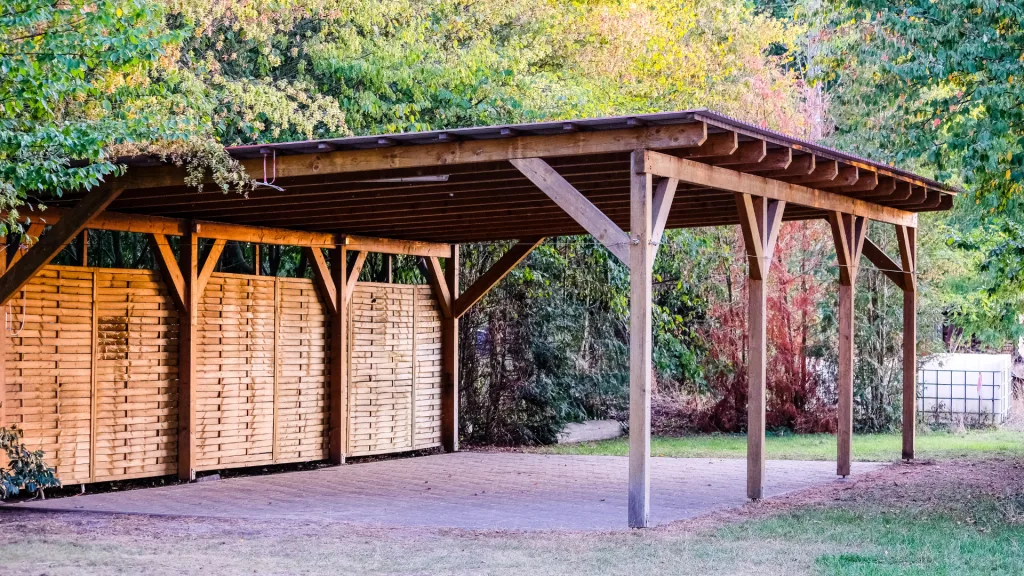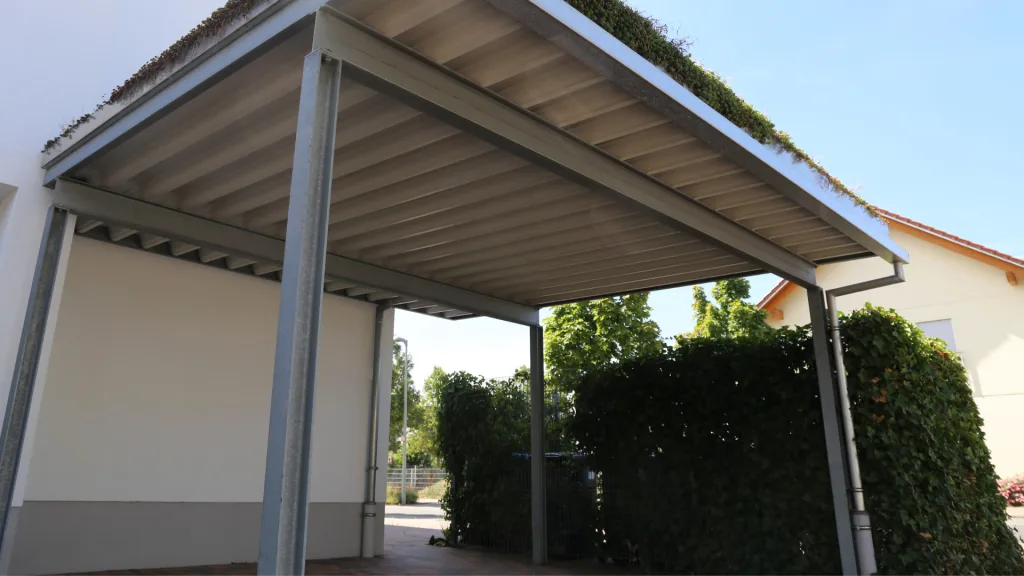Travelers who want their rigs to last for years know that RV carports may help protect their investment.
However, while they can be a cost-effective way to protect your motorhome, they’re far from weatherproof.
If you’re on the fence about whether or not you should purchase an RV carport for your rig, we can help. Today, we’re sharing the advantages and disadvantages of this accessory and whether it’s worth it.
Let’s dive in!
What Are RV Carports?
RV carports are durable shelters for your camper that come in various shapes, sizes, and colors. However, no matter what size, shape, or color you get, the purpose of the shelter is for you to park under it. It protects your rig from the elements when you’re not using it.
However, these carports typically don’t have walls that go all the way to the ground. Usually, they’re designed to be an overhead structure that keeps the sun and rough weather from beating down on the exterior.
While some RVers use these to store their rig, some carports are large enough to create stationary spots. They’re wide enough that the slides on the camper can fully extend without causing damage.

Benefits of RV Carports
There are several benefits to having one of these shelters for your trailer. Let’s take a look at some of the reasons people love using them.
Cheaper Than a Garage
While having a large barn or garage to store your RV would be great, they’re also terribly expensive. You could easily spend $30,000 to $60,000 on the structure. However, carports are a fraction of the price and provide similar results.
By choosing one of these shelters over a garage, you can stay in some fancy parks or resorts with the money you’re saving. In addition, it’s always nice to have cash in the bank to help take care of any upgrades or repairs you need on your rig.
Easy to Erect
Another reason you should consider an RV carport for your shelter is the ease of construction. Since these aren’t seen as permanent structures, you likely won’t need a permit or approval to erect your shelter. However, you’ll want to check with your local code enforcement to avoid a fine.
Additionally, if you’re physically fit and able, you could save thousands of dollars by putting your kit together. This can be a fun project that can leave you with a sense of accomplishment.
However, before clicking “buy” on your kit, ensure you know what’s expected from you when putting it together. You don’t want to bite off more than you can chew if you don’t have the appropriate skills or tools for the job.
Protection from Weather
The biggest benefit of an RV carport is the protection it provides your rig. Keeping the sun and weather elements off of it can help extend the life of your roof and the seals that help prevent leaks. While you’ll still want to check your seals regularly, having them sit under a protective shelter ensures they last as long as possible.
Unfortunately, mother nature can be a beast, and you never know what to expect regarding the weather. Hail can destroy your skylights and roof in a matter of minutes. In addition, if you live in an area that experiences large amounts of ice and snow, the weight of these sitting on your RV can cause structural damage. However, with a carport, you have an extra layer of protection.
Pro Tip: No RV carport? No problem! We uncovered Which RV Storage Facilities Are Decent, Better & Best

Disadvantages of RV Carports
Are RV carports perfect? Absolutely not. There are a few things that owners aren’t crazy about them. Awareness of the disadvantages upfront can help save you from experiencing buyer’s remorse.
Less Sturdy Compared to a Garage
There’s a reason why a garage will cost thousands of dollars more than a carport. They have a solid foundation and are entirely contained. Carports are cheap because they’re made from more inexpensive materials to save weight and reduce costs. If you expect to have the same quality and a solid structure, think again. You’ll find yourself experiencing disappointment.
Not Entirely Secure
RV carports aren’t nearly as secure as a garage. Garages are entirely enclosed with four walls and doors that close and have locks. Most carports don’t go all the way to the ground, let alone a door to keep anyone that’s up to no good away from your camper.
A carport won’t cut the mustard if you want to protect your RV from more than the rain and snow. While some have doors or added security features, they’re typically substantially more expensive than a standard carport. Your rig will likely be vulnerable to anyone wanting to access it.
Doesn’t Increase Property Value
If you’re hoping to increase your property value, an RV carport isn’t going to do the trick. These aren’t permanent structures, and they’re not going to last forever. As a result, you shouldn’t expect that it will increase your property value or even be a selling feature.
However, an oversized garage with a massive door can serve various purposes and increase your property value. If you go to sell your home someday, a future buyer would likely find a garage more attractive than a carport.

How Tall Does a Carport Need to Be for a Camper?
If you’re buying an RV carport, you need to consider the height of your rig. However, don’t make the mistake of getting a setup only a few inches taller than your camper. Adding a few additional feet allows you to get on the roof without moving it. This can spare you a headache when it’s time for maintenance.
RV heights vary considerably depending on the type. Fifth wheels range from 11 to 13 feet, and travel trailers range from 10 to 12 feet. Motorhome heights can vary considerably as well. You’ll need to figure out the right size for your specific setup.
When measuring vehicle height, don’t forget to account for air conditioners or if you want the room to work on your rig. Once you build the shelter, there’s no turning back.
Is It Better to Cover an RV or Not?
There tends to be a debate about covering an RV or not. While very few argue against covered storage, the type of storage is essential. An RV cover is like a cover for fancy vehicles you see parked in a parking lot, only much, much bigger.
However, if it isn’t fitted correctly for your rig, it can cause severe damage. Howling winter winds can rub the material against your camp, and you’ll be in for a surprise the next time you’re heading out. As a result, some people choose covered storage instead.
If you’re paying for covered storage in a storage lot, you need to know that it can be costly. You can easily spend hundreds of dollars monthly for a covered parking space at a storage lot.
Covering your RV is essential if you want it to last. If not, you’ll likely experience increased wear and tear from the weather elements. Sometimes it’s best to bite the bullet and pay for premium storage to keep your camper safe and ready to go when you want to use it.
Pro Tip: Want to reorganize your RV? Use these 7 Easy Garage Storage Ideas.
Are RV Carports Worth It?
The last thing anyone wants is hail damage or broken seals. We like to keep our RV looking fresh, clean, and ready to go when we want to hitch up and head out on an adventure.RV carports are fantastic options to protect your camper if you have the space. However you store your rig, anything that helps reduce the wear and tear on our roof and other components is worthwhile.
Just take your time to research the best options for your situation, and you’ll be able to enjoy your next trip without any surprises.
We’ll Help You Find the Best Free Camping in the USA
You should give it a try!
As a matter of fact, these free campsites are yours to enjoy. Every time you pay federal taxes, you’re contributing to these lands.
Become a FREE CAMPING INSIDER and join the 100,000 campers who love to score the best site!
We’ll send you the 50 Best Free Campsites in the USA (one per state). Access the list by submitting your email below: